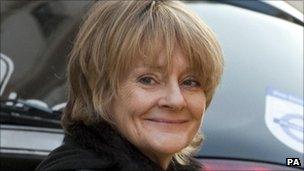Leveson Inquiry: Times editor in hacking email apology
- Published
James Harding: "I sorely regret this intrusion"
The editor of the Times has publicly apologised for a reporter who hacked into an email account to write a story.
James Harding had been asked to come back to the Leveson Inquiry to clarify his part in the affair.
Lord Justice Leveson also decided that Daily Mail editor Paul Dacre must return a second time to resolve a row between his paper and actor Hugh Grant.
Earlier, a former Press Complaints Commission chairman said the watchdog was scapegoated over phone-hacking.
Baroness Buscombe, who quit last year over the backlash to the scandal, told the Leveson Inquiry many found it easier to attack the PCC than the press. Among them, she said, were politicians and the newspapers themselves.
'Sorely regret'
Mr Harding, appearing for a second time, apologised to Lancashire police detective Richard Horton, whose emails were accessed in 2009 by a Times journalist.
The reporter had been trying to unmask him as the author of the anonymous NightJack blog.
Mr Harding said: "In the last couple of weeks I have learned a great deal more about what happened in this incident."
He continued: "As editor of the paper I'm responsible for what it does and what its journalists do.
"I sorely regret the intrusion into Richard Horton's email account by a journalist. I'm sure that Mr Horton and many other people expect better of the Times, and so do I. So on behalf of the paper, I apologise."
Previously, the inquiry has heard the Times fought a High Court battle to name Mr Horton as the writer of the blog after the reporter told his managers he had tried to access an email account.
Mr Harding said if he had been told the email account had been hacked into, the journalist would have faced disciplinary action and the story abandoned.
"I would have said that the intrusion was not warranted in the public interest. But he didn't come to me."
'Degree of trust'
Earlier Baroness Buscombe told the inquiry that during her two years as PCC chairman she had lost trust in editors and felt they had not told her the truth.
"I had to question the editors on the PCC in my head. It was very difficult. These were editors I had worked with," she said.
"I want to support a self-regulatory system because I believe there's a real problem with the alternative, ie. state regulation, but this demands a degree of trust."

Baroness Buscombe said she lost trust in editors and felt they had not told her the truth
Asked about the PCC's own investigation into phone-hacking allegations, Baroness Buscombe said she regretted being misled by News International and taking what police told her "on trust".
The Financial Times, the Guardian and the Mirror had all threatened at stages to leave the PCC over adjudications for mistakes and code breaches, she said.
However the FT has disputed the claim, telling BBC News: "The FT has never complained to the PCC about adverse adjudications nor has it ever threatened to leave the PCC because of rulings against the newspaper."
The Mirror also denied the claim, saying: "The Mirror has not threatened to leave the PCC in recent years."
'Mendacious smears'
Lord Justice Leveson said he would recall Paul Dacre to face more questions on accusations by Hugh Grant. He is expected to return later this week.
Previously, Mr Dacre accused Grant of making "mendacious smears" after he claimed a Mail on Sunday story came from illicit eavesdropping.
On Monday, Mr Dacre said he knew of no cases of phone hacking at the Mail.
Mr Dacre, also editor-in-chief of Associated Newspapers, publishers of the Mail and the Mail on Sunday, said he would withdraw the "smears" statement if Grant withdrew his claims the Daily Mail or Mail on Sunday were involved in phone hacking.
Dominic Mohan, the Sun's editor, recalled to give evidence, was asked about stories involving celebrities, including Martine McCutcheon and the Spice Girls from when he was editor of the showbusiness pages, Bizarre.
Others giving evidence included Ronald Zink, of Bing, Neil Turner, of the British Press Photographers' Association, and Colin Crowell, from Twitter.
- Published7 February 2012